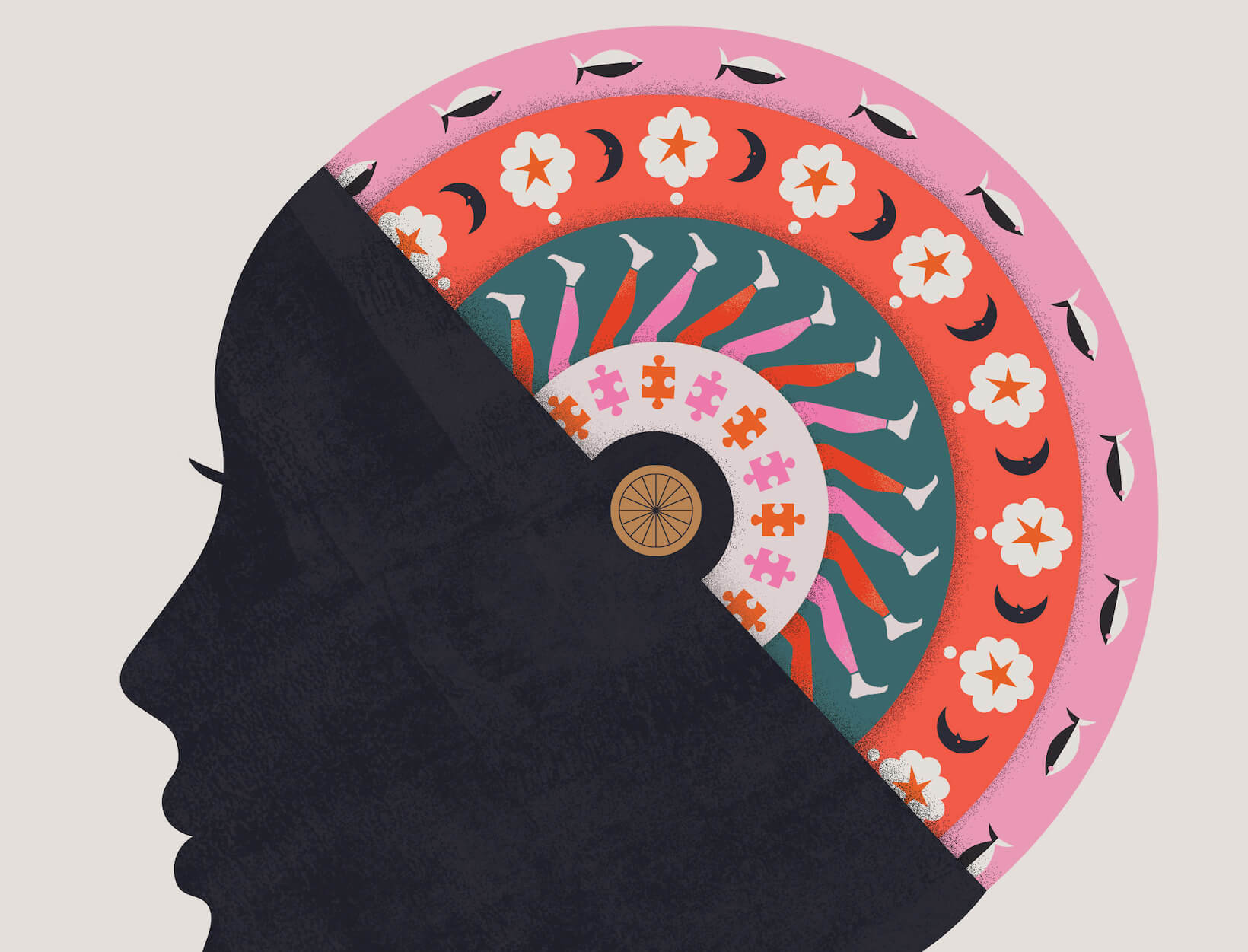[ad_1]
Can You Save Your Mind from Cognitive Decline?

Illustration courtesy of Vicki Turner
It’s potential to enhance studying, reasoning, and reminiscence as your mind ages. However for those who’re dedicated to your every day crossword puzzle within the hopes that it alone will maintain you sharp, it actually doesn’t work that manner. Researchers say there’s no silver bullet for enhancing cognition. “It’s not nearly crossword-puzzle-solving,” says Anja Soldan, PhD, an affiliate professor of neurology at John Hopkins College, who’s at the moment engaged on a analysis research on how the mind ages. “Exposing your self to new issues, new concepts, new experiences—that’s useful.”
Creating novel experiences can assist construct what scientists name your cognitive reserve. It’s exhausting for them to outline, however because the title suggests, it’s like backup psychological exercise. Because the construction of your mind (together with the cerebral cortex, particular mind areas, and white matter tracts that join areas of the mind) begins altering and probably shrinking with age and plaques and entangles doubtlessly start to develop, extra cognitive reserve offers your mind resilience that permits it to proceed to perform nicely, even when its bodily construction isn’t at its finest.
The idea of cognitive reserve comes from a 1989 research of post-mortem outcomes of older ladies. They have been thought-about cognitively wholesome on the time of their deaths, but their brains had many plaques which might be seen in folks with superior Alzheimer’s illness. Scientists attributed the discrepancy between the ladies’s bodily brains and their cognitive well being to some kind of reserve that allowed them to compensate for the modifications of their mind.
Constructing Cognitive Reserve
What creates cognitive reserve? “We don’t have a very good understanding but,” Soldan says. “We’re solely beginning to get an understanding of what’s occurring within the mind that permits somebody to have what we predict is extra reserve than any individual else.” It might be something from the scale of an individual’s mind to a rise in mind connectivity due to how engaged they’ve been all through life. “We predict it has to do with how we course of duties in our mind, how we resolve issues, how we keep in mind—these cognitive processes are most likely extra resilient in some folks than in others,” says Yaakov Stern, PhD, a professor of neuropsychology at Columbia College.
Analysis reveals that the issues which might be typically wholesome on your mind are most likely useful in constructing your cognitive reserve, together with:
Training. Research present that individuals who have extra years of schooling have a diminished threat of creating dementia and different age-related cognitive decline, in comparison with these with fewer.
Leisure and social actions. “There are research suggesting that higher engagement in actions which might be cognitively, socially, or bodily stimulating is helpful,” says Soldan. In a single research, individuals who hung out with mates or household, studying, going out to eating places or to see a film, strolling, or vacationing have been much less prone to develop dementia later in life.
Stimulating work. A research confirmed that individuals with extra complexity of their work—something that concerned decision-making, problem-solving, inventive considering, or teaching or mentoring others—have been much less prone to expertise speedy cognitive decline throughout retirement.
A balanced weight-reduction plan. Analysis reveals {that a} balanced weight-reduction plan—loads of veggies, fruits, beans, nuts, entire grains, and wholesome fat—might profit cognitive perform later in life. Making a balanced weight-reduction plan with your life-style and meals preferences in thoughts is essential.
Bilingualism. Studying a second (or third or fourth) language might assist construct cognitive reserve, too, however consultants say that the analysis is conflicting on bilingualism. Some research discover it useful, whereas others don’t. It seemingly relies on how nicely the particular person is aware of the second language, how usually they use it, and whether or not they incessantly change forwards and backwards. Both manner, it doesn’t harm to study one other language.
Scientists aren’t but certain how these behaviors doubtlessly profit cognitive reserve, however they might be rising mind connectivity by enhancing synchronicity of mind areas, strengthening neuronal connections, or enhancing neurotransmitter functioning.
So for those who should end your every day crossword puzzle, do it since you take pleasure in it. “You hear so much about mind coaching or doing crossword puzzles [for cognition], however I don’t suppose there’s anyone magic exercise,” Stern says. The secret’s being engaged—bodily, cognitively, and socially—all through life.
Associated Studying
Dopamine Fasting: A Deceptive Title however a Highly effective Protocol
This text is for informational functions solely, even when and no matter whether or not it options the recommendation of physicians and medical practitioners. This text isn’t, neither is it supposed to be, an alternative choice to skilled medical recommendation, analysis, or therapy and will by no means be relied upon for particular medical recommendation. The views expressed on this article are the views of the knowledgeable and don’t essentially symbolize the views of goop.
[ad_2]


